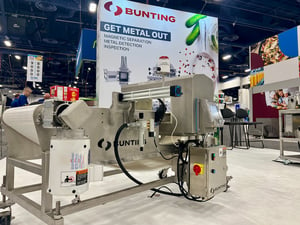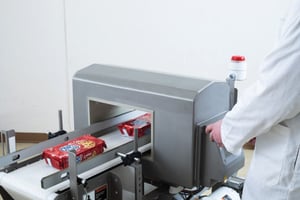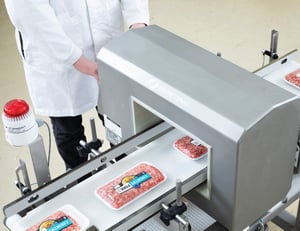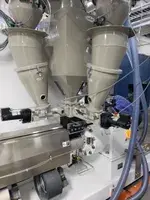Conveyor Metal Detector
![]()
| Materials: | Packaged and unpackaged food products, finished goods, and bulk items on conveyor belts |
| Detects: | Ferrous, non-ferrous, and stainless steel |
| Operation: | Integrated conveyor and metal detector system |
| Applications |
Food processing, packaging, and quality control |





Conveyor Metal Detector Systems
Conveyor Metal Detectors are complete inspection systems that combine a conveyor and a metal detector into one integrated unit. Designed for food operations, they provide reliable detection of ferrous, non-ferrous, and stainless steel contaminants while maintaining smooth product flow. Each system is custom-built for the application, helping processors protect equipment, prevent recalls, and meet strict quality and safety standards.
Animation
- About
- Benefits
- Applications
- How They Work
- Videos
Bunting Conveyor Metal Detectors combine a precision-engineered conveyor with advanced metal detection technology to deliver seamless inspection and reliable product handling. Built specifically for food processing and packaging environments, they detect ferrous, non-ferrous, and stainless steel contaminants before they can compromise product quality or safety.
Each system is custom-built to suit specific line requirements, including tunnel size, belt width, reject mechanisms, and integration with existing automation or data capture systems. Units are supplied fully calibrated and ready for installation to minimize setup time and disruption.
Constructed from stainless steel with a hygienic design, Conveyor Metal Detectors are compatible with washdown environments and meet the strict standards required by the food industry. Intuitive touch-screen controls, automatic product learning, and digital signal processing ensure consistent detection across a wide range of products, packaging formats, and line speeds.
By combining high-sensitivity inspection with robust design, these systems help food manufacturers maintain product integrity, prevent costly recalls, and ensure compliance with global safety standards.
Integrated Detection and Conveyance
Combines a conveyor and metal detector into one system for seamless, ready-to-run operation.
High-Sensitivity Performance
Detects ferrous, non-ferrous, and stainless steel contaminants in packaged and unpackaged food products.
Supports Food Safety Compliance
Designed to meet global food safety standards including HACCP, FSMA, FDA, USDA, IFS, BRC, SQF, and GFSI.
Plug and Play Installation
Delivered factory-calibrated and ready for immediate integration into production lines.
Custom Configurations
Available with various tunnel sizes, belt widths, and reject mechanisms to fit product and line requirements.
Durable, Washdown-Ready Construction
Built from stainless steel with hygienic design features for use in wet or washdown environments.
Continuous 24/7 Operation
Engineered for long-term reliability in demanding food production settings with minimal maintenance.
Conveyor Metal Detectors are used throughout food manufacturing and packaging operations to ensure safety, compliance, and quality assurance.
Food Processing and Packaging
-
Inspects bakery goods, frozen meals, meats, dairy, snacks, powders, and bulk ingredients
-
Detects metal contaminants before packaging or final inspection stages
-
Supports food safety programs such as HACCP, FSMA, and GFSI
-
Integrates with automatic reject systems including pushers, diverters, and air-blast units for product removal
Quality Assurance and Compliance
-
Protects against product contamination and costly recalls
-
Ensures traceability and verification within quality control systems
-
Strengthens consumer confidence and brand reputation through reliable detection
By combining precision inspection with hygienic design, Conveyor Metal Detectors help food producers maintain consistent quality while protecting equipment, product, and brand integrity.
Conveyor Metal Detectors combine a tunnel-style detection coil and conveyor into one integrated inspection system. As products travel along the conveyor, they pass through the detection coil, which scans for ferrous, non-ferrous, and stainless steel contaminants.
When metal is detected, the system processes the signal and automatically triggers the chosen response, such as activating an alarm, stopping the belt, or removing the product through a reject mechanism.
With advanced features such as automatic product learning, dual-frequency operation (multiMODE), and product imaging software (imagePHASE), Conveyor Metal Detectors provide accurate, high-speed inspection across diverse food products and packaging formats.
FAQ's
A Conveyor Metal Detector is an integrated inspection system that combines a conveyor belt with a tunnel style detection coil. As products move along the belt, the detector scans for ferrous, non-ferrous, and stainless steel contaminants and automatically triggers a response to remove them.
They can detect ferrous, non-ferrous, and stainless steel contaminants, even in products with varying moisture or salt content.
Conveyor Metal Detectors can inspect packaged and unpackaged foods, including bakery items, frozen meals, meats, dairy, snacks, powders, and bulk ingredients.
They detect and remove contaminated products before packaging or shipment, helping food manufacturers meet HACCP, FSMA, FDA, USDA, IFS, BRC, SQF, and GFSI standards.
Yes. Each system is custom-built and supplied ready for installation, making integration simple and minimizing downtime.
Yes. Food-grade stainless steel construction and hygienic design make them ideal for washdown and high-hygiene areas.
Application Photos



Application Photos








Talk to an Application Engineer
Not sure what you need? Let’s talk through your application and identify the right solution.

